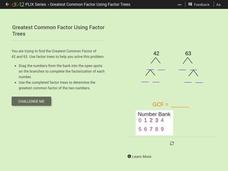Curated OER
Introducing the Concept Prime Factors
Fifth graders identify the prime factorization for 48 using different sets of factors. They find the prime factorization for 60.
Curated OER
Prime Factors
In this prime factor worksheet, students write numbers as a product of primes. Explanations and examples are provided prior to the exercise. This two-page worksheet contains ten problems.
Curated OER
Prime Factors
Fifth graders review the concept of prime factorization. Then, they use the rules for divisibility and other notions to find the prime factorization of unfamiliar numbers. They solve problems in a whole class setting.
Curated OER
Number Theory Worksheet 2: The Sieve of Eratosthenes
In this primes and multiples activity, students follow the directions to circle primes and multiples on a hundred chart until all prime numbers from 1 to 100 are circled. This is called the Sieve of Eratosthenes.
Curated OER
The Age-Old Problem
In this word problem worksheet, students solve 1 short answer word problem. Students determine the age of two boys given information such as their ages are the product of prime numbers.
Curated OER
Counting From 1 to 20
Children are given a mixed up number chart 1-20, and are asked to sort out all the even, odd, prime, and composite numbers. This worksheet is intended for 2nd grade but may not be suitable for learners under 10 or those who have not yet...
Curated OER
Number Line Mathematics
Students translate problem situations into diagrams, models, and numerals using whole numbers, fractions, mixed numbers, decimals, and percents. They identify that numbers in different forms are equivalent or not equivalent using whole...
Curated OER
Prime Factorization
Sixth graders participate in a lesson that focuses on the concept of finding the prime factorization of a number. They write the answer using exponential notation. Students play a game of Bingo to keep engaged during the lesson.
Curated OER
Leveled Problem Solving: Prime Factorization
In this prime factorization worksheet, learners solve a set of 6 problems related to prime factorization, including determining whether numbers are prime or composite and determining factors.
Curated OER
Identify Numbers
For this identify numbers worksheet, students identify prime, composite, perfect, deficient, and abundant numbers listed on a one-hundred board. This two-page worksheet contains one-hundred numbers on each page.
Curated OER
Prime Factorization
In this prime factorization worksheet, students list the prime factors of the 2 digit numbers given to them. Students complete 9 problems.
Curated OER
Prime Factorize
In this prime factorization worksheet, students prime factorize the nine given numbers on a line. Each number goes to the hundreds place.
Curated OER
Patterns
In this Algebra I worksheet, 9th graders explore number and geometric patterns and use the Sieve of Eratosthenes to find the prime numbers less than one hundred. The six page worksheet contains eight multipart questions. Answers are...
Curated OER
Primes and Exponents
In this primes and exponents instructional activity, students read about prime numbers and their expressions, then work with a group to complete 6 problems.
Curated OER
Eratosthenes Sieve¦
In this math worksheet, learners find the prime numbers through going through the factors in sequential order. The answers are used to create the words at the bottom of the page.
Curated OER
Unit 2 Section 2: Prime Factors
In this prime factors learning exercise, learners make six factor trees. They tell the prime factorization for eight numbers. Students answer three questions regarding the prime factorization of numbers.
Curated OER
Prime factors
In this prime factors worksheet, 6th graders find the prime factors of two digit numbers. Students complete 6 problems where they find prime factors.
Curated OER
Mathematics: Prime and Composite Numbers
Sixth graders explore how to apply the commutative property and the rules of divisibility. They examine the difference between prime and composite numbers.
Curated OER
Sets and the Venn Diagram
Students review number sets and complete a Venn Diagram for number sets. In this number sets lesson, students review integers, whole numbers, and elements. Students use computers to create a Venn Diagram for number sets. Students...
K12 Reader
Eratosthenes: Geographer and Mathematician
Mathematicians can be famous, too! Introduce your class to Eratosthenes with a reading passage. After they complete the passage, learners respond to five questions, some of which require opinions and others reading comprehension skills.
EngageNY
Polynomial, Rational, and Radical Relationships
This assessment pair goes way beyond simple graphing, factoring and solving polynomial equations, really forcing learners to investigate the math ideas behind the calculations. Short and to-the-point questions build on one another,...
Scholastic
Study Jams! Divisibility Rules
Learning division is a challenge for many young mathematicians, but this presentation on divisibility rules can make it much easier. Seven different rules are clearly explained and modeled with the support of multiple examples. Consider...
Chapman University
Fundamental Theorems of Mathematics
There are four fundamental theorems of mathematics: arithmetic, algebra, calculus, and linear algebra listed here. Each one is described on this poster or handout. The challenge for a student of math is to figure out why they are true.
CK-12 Foundation
Greatest Common Factor Using Factor Trees
Beginning with a description that sets the stage, learners are asked to break down the numbers 42 and 63 to find the greatest common denominator using factor trees. As they work through the factoring process, young mathematicians are...

























